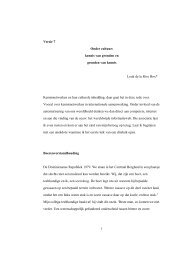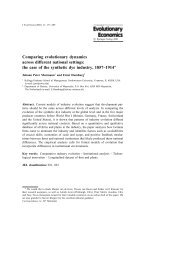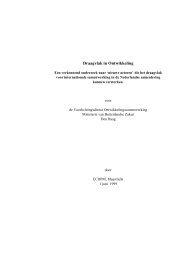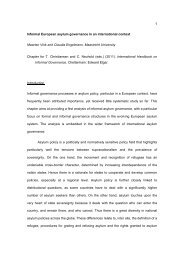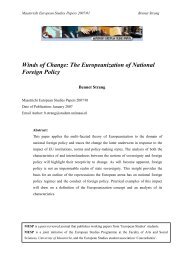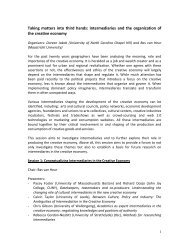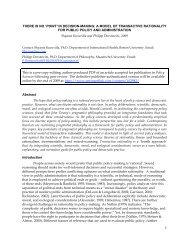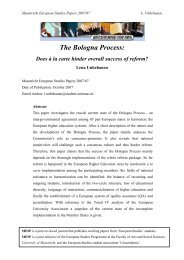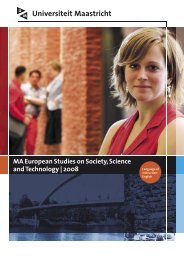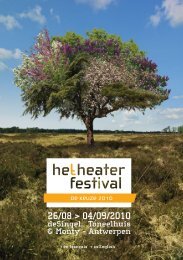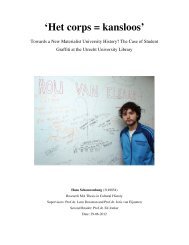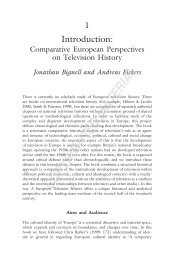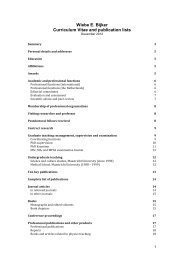Crossing the divide: - Maastricht University
Crossing the divide: - Maastricht University
Crossing the divide: - Maastricht University
You also want an ePaper? Increase the reach of your titles
YUMPU automatically turns print PDFs into web optimized ePapers that Google loves.
empirical research accompanying this form of international cooperation.<br />
Researchers ei<strong>the</strong>r were not interested, or could not interest funding agencies in<br />
supporting such research. Second, we may conclude that <strong>the</strong> funding agencies have<br />
not been particularly forthcoming in publishing data on <strong>the</strong>ir programmes. Third, we<br />
note that <strong>the</strong> recipient governments, with some notable exceptions, have not been<br />
interested in sponsoring development-oriented research.<br />
O<strong>the</strong>r relevant literature<br />
One word about <strong>the</strong>se novel forms of cooperation, and <strong>the</strong> terms that are used to<br />
denote <strong>the</strong>m. The new literature abounds with terms like networks, linkages and<br />
partnerships. In <strong>the</strong>ir vagueness <strong>the</strong>y may lose meaning. For <strong>the</strong> sake of clarity, I<br />
understand cooperation as a form of organised interaction towards a common end<br />
for mutual benefit. 13 A network is a relatively loose form of cooperation in which<br />
coordination is done through horizontal exchanges of information, lacking a clear<br />
hierarchy and a long-term commitment. 14 A partnership is a highly structured form of<br />
cooperation that “entails a long-term commitment and reflects a condition of mutual<br />
dependency [involving] a set of normative rules, determining what behaviour is<br />
permissible and what constitutes a violation of trust. The rules are designed to<br />
facilitate exchange in a situation that would o<strong>the</strong>rwise be open to exploitation”. 16<br />
Over <strong>the</strong> past two decades <strong>the</strong>se forms of collaboration have been established in<br />
international cooperation in research. Especially in <strong>the</strong> official development<br />
assistance programmes of donor agencies, <strong>the</strong>y are adopting an increasingly<br />
significant role. Although it is too early to draw final conclusions about <strong>the</strong>se<br />
programmes, a few trends can be noted.<br />
Public support to scientific cooperation has been an increasingly significant factor,<br />
due to <strong>the</strong> declining budgets for research in poor countries and for developmentoriented<br />
research in <strong>the</strong> North. Since <strong>the</strong> funding agencies have been able to call<br />
<strong>the</strong> tune, <strong>the</strong>y have also had a great influence over <strong>the</strong> form that such cooperation<br />
takes. The notion of networks, for example, is strong in European programmes<br />
fostering collaboration between researchers in different European countries.<br />
Although <strong>the</strong>re is little research on <strong>the</strong> costs and benefits of such networks, <strong>the</strong>y are<br />
a commonly accepted requirement for funding (Marschan-Piekkari 2001). The same<br />
model has been applied to cooperation between Europe and poor countries, leading<br />
to ad hoc alliances. It can be seriously questioned if <strong>the</strong> factor of trust was<br />
sufficiently created in <strong>the</strong> relations so developed.<br />
Linkage between users and producers in research is ano<strong>the</strong>r such requirement.<br />
Funding is increasingly made conditional on <strong>the</strong> involvement of users. Take<br />
biotechnology research sponsored by <strong>the</strong> Ne<strong>the</strong>rlands. It has been based for <strong>the</strong><br />
past decade on <strong>the</strong> notion that user involvement needs to be promoted (Ulmanen<br />
2001: chapter 3). This is hard to achieve in Europe, let alone in countries like<br />
Zimbabwe or India.<br />
A preliminary review by Lotte Asveld (2001), a student-researcher from <strong>Maastricht</strong>,<br />
indicates that this difficulty is becoming <strong>the</strong> Achilles heel of development-oriented<br />
research. She shows that researchers, farmers and policymakers may all agree on



